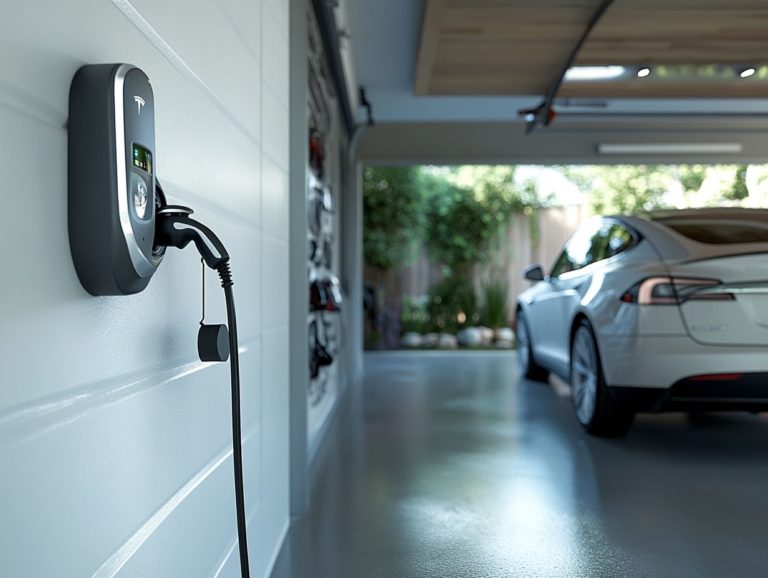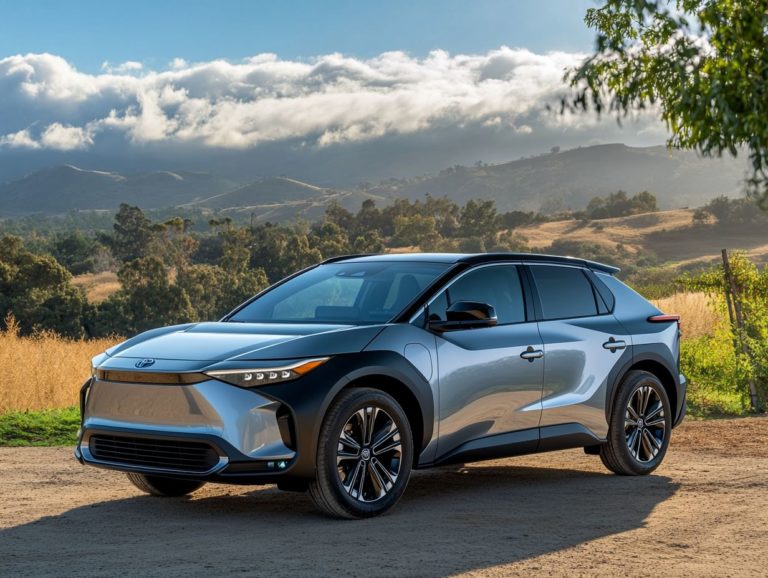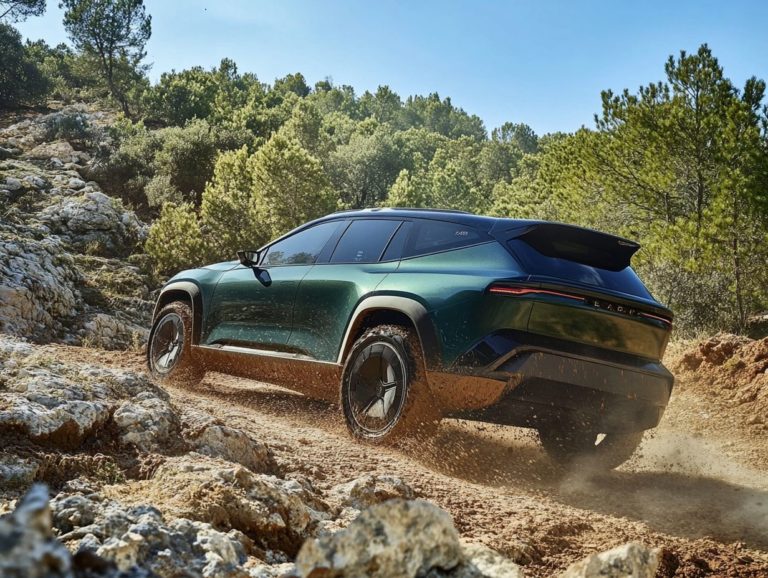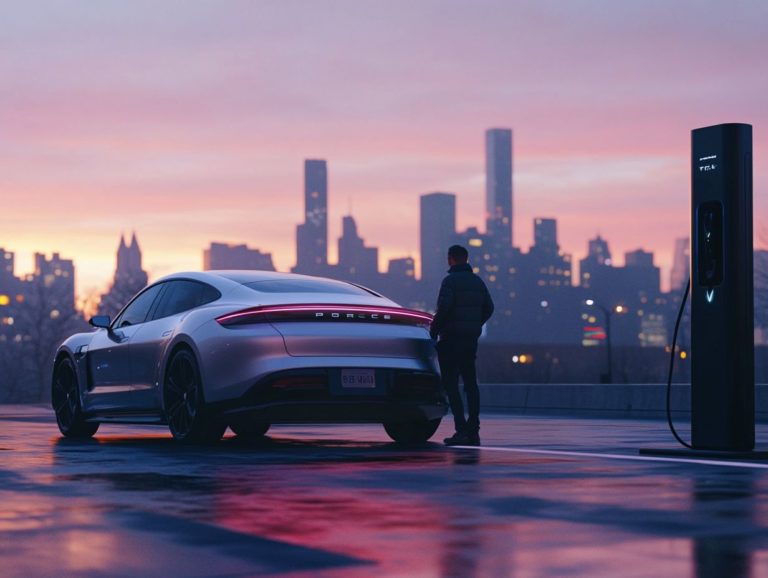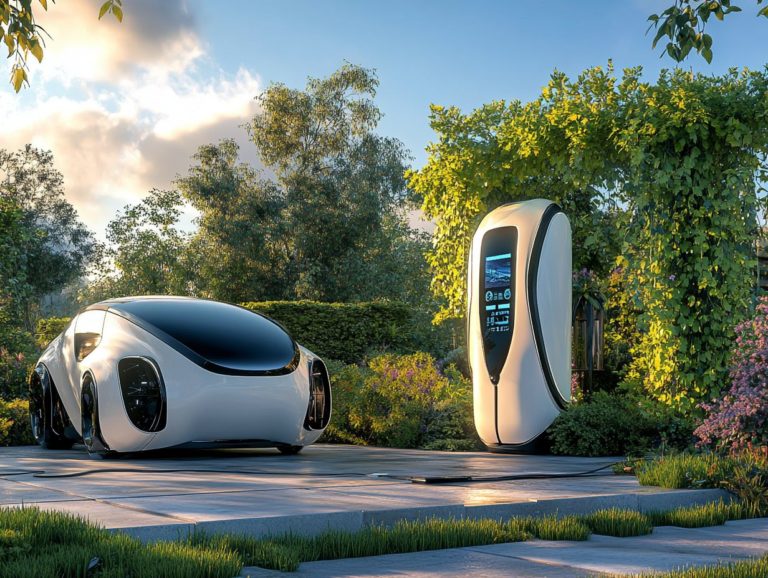The Environmental Impact of Electric Vehicles
Electric vehicles (EVs) are swiftly reshaping the transportation landscape, offering you a glimpse into a cleaner, more sustainable future.
In this exploration of EVs, you’ll discover their remarkable environmental benefits, particularly in reducing emissions and pollution. However, it s not all a smooth ride; you’ll encounter significant challenges and limitations associated with this transition, including infrastructure hurdles and battery concerns.
By comparing EVs to traditional vehicles, you can gain a deeper understanding of their overall impact and costs. As we look to the future of electric vehicles, this analysis delves into the advancements on the horizon and their potential to reshape your world.
Contents
- Key Takeaways:
- Overview of Electric Vehicles
- Environmental Benefits of Electric Vehicles
- Reducing Emissions and Pollution
- Challenges and Limitations of Electric Vehicles
- Comparison to Traditional Vehicles
- Future of Electric Vehicles
- Frequently Asked Questions
- What is the environmental impact of electric vehicles?
- Do electric vehicles contribute to reducing greenhouse gas emissions?
- Do electric vehicles have any negative environmental impacts?
- How do electric vehicles impact air quality?
- What is the role of renewable energy in reducing the environmental impact of electric vehicles?
- How can individuals contribute to reducing the environmental impact of electric vehicles?
- Conclusion
Key Takeaways:
- Electric vehicles offer significant environmental benefits, including reducing emissions and pollution compared to traditional vehicles.
- Infrastructure and battery concerns pose challenges for widespread adoption of electric vehicles, but advancements and potential impacts make them a promising solution for the future.
- When comparing the environmental impact and cost analysis of electric vehicles against traditional vehicles, it is clear that electric vehicles are a more sustainable option for transportation.
Overview of Electric Vehicles
Electric vehicles (EVs) represent a major change in the transportation sector, offering you a greener alternative to traditional gasoline cars while significantly reducing carbon footprints and greenhouse gas emissions.
These innovative vehicles harness renewable energy for power and are equipped with advanced technologies like electric motors and lithium-ion batteries, which are commonly used in portable electronics and electric vehicles, enhancing their efficiency and sustainability.
Notable players in the electric vehicle market, such as Tesla and the Nissan Leaf, exemplify the potential of EVs in fostering a carbon-neutral lifestyle, all backed by initiatives from organizations like the Department of Energy.
What are Electric Vehicles?
Electric vehicles are the epitome of zero-emission transportation, utilizing electric motors instead of traditional internal combustion engines. Choosing an electric vehicle means you re opting for a cleaner and greener drive for your daily commute.
You ll primarily encounter two types of electric vehicles: battery electric vehicles (BEVs) and plug-in hybrid electric vehicles (PHEVs). BEVs rely on large batteries that you can recharge at home or at charging stations, effectively eliminating your need for gasoline.
In contrast, PHEVs combine an electric motor with a traditional gasoline engine, providing you with extended range and flexibility. This dual system allows you to seamlessly switch between electricity and gasoline, further reducing your reliance on fossil fuels.
When compared to conventional vehicles, electric options not only produce fewer emissions but also incorporate advanced technology. Features like regenerative braking, which captures energy normally lost during braking, and smart energy management contribute to a more sustainable future, enhancing your driving experience while caring for the planet.
Environmental Benefits of Electric Vehicles
The environmental benefits of electric vehicles (EVs) are substantial, significantly reducing emissions and minimizing tailpipe pollution. This not only enhances air quality but also promotes a cleaner environment.
By transitioning from traditional gasoline vehicles to EVs, you can effectively lower CO2 emissions in the transportation sector, resulting in a notable decrease in greenhouse gases in the atmosphere.
Integrating clean energy sources in EV charging and advancing battery recycling technologies contribute to a sustainable lifecycle for electric vehicles.
Now is the time to consider how electric vehicles can lead us to a healthier planet.
Reducing Emissions and Pollution
Electric vehicles offer exciting benefits that can change how we think about transportation. They significantly reduce greenhouse gases and CO2 emissions, especially when powered by renewable energy instead of fossil fuels.
This impressive efficiency comes from their operation; they convert stored electrical energy into movement far more effectively than traditional gasoline cars, which rely on combustion and release pollutants in the process. Powering these vehicles with energy from wind, solar, or hydroelectric sources makes their environmental benefits even clearer. Innovations in battery technology and electric drivetrain design enhance both range and performance.
As the electric grid embraces renewable sources, ongoing reductions in emissions are to be expected. This shift to electric mobility not only benefits you individually but also aligns with broader climate objectives, paving the way for a more sustainable future.
Challenges and Limitations of Electric Vehicles
Electric vehicles present a wealth of advantages, yet they also face significant challenges and limitations, particularly regarding infrastructure and battery issues.
It s vital to develop a robust charging infrastructure that meets consumer needs, as range anxiety remains a prevalent concern due to the scarcity of charging stations.
The environmental implications tied to battery manufacturing, such as the extraction of lithium, cobalt, and nickel, raise important sustainability questions for EVs.
Infrastructure and Battery Concerns
The infrastructure surrounding electric vehicles is crucial for their widespread adoption, particularly the availability of charging stations and efficient battery recycling processes.
Now is the time to embrace the growing demand for electric vehicles! Establishing robust charging networks becomes imperative. This involves not just increasing the number of charging stations but also ensuring they are strategically placed and integrated with systems that allow your vehicle to use and return energy to the power grid.
These systems enable your electric vehicle to draw energy from the grid while also returning energy during peak demand, enhancing the grid’s resilience. By incorporating advanced energy storage solutions, you can effectively address concerns regarding supply and demand imbalances.
When paired with sustainable battery recycling initiatives, this comprehensive approach minimizes waste and promotes responsible material usage, ultimately paving the way for a more sustainable future in transportation.
Comparison to Traditional Vehicles
When comparing electric vehicles to traditional gasoline cars, substantial differences become apparent, especially concerning their environmental impact and cost analysis.
Electric vehicles produce zero tailpipe emissions, while internal combustion engines emit harmful pollutants and greenhouse gases, exacerbating climate change.
The long-term operational costs of EVs, with their reduced maintenance needs, can offer significant economic benefits over their gasoline counterparts.
Environmental Impact and Cost Analysis
The environmental impact and cost analysis of electric vehicles reveal that they produce significantly lower CO2 emissions per mile compared to gasoline vehicles, positioning them as a more sustainable choice for you.
On average, electric vehicles emit around 0.3 pounds of CO2 per mile, while traditional fossil fuel-powered cars can exceed 1 pound. This is influenced by factors such as fuel type and engine efficiency. The energy consumption of electric vehicles is impressively efficient, with many models delivering the equivalent of 4 miles per kilowatt-hour, whereas gasoline vehicles typically achieve only 20-30 miles per gallon.
When you consider operating costs, you can save hundreds each year on fuel expenses alone, as electricity prices frequently undercut those of gasoline. This not only highlights the long-term financial advantages for you but also reinforces the crucial role electric vehicles play in reducing greenhouse gas emissions and promoting a cleaner environment.
Join the movement towards cleaner, more sustainable transportation today!
Future of Electric Vehicles
The future of electric vehicles shines brightly, with continuous advancements in technology transforming the market and elevating their role in promoting sustainable practices.
Innovations in battery technology, such as enhancements in lifespan and recycling methods, are setting the stage for cleaner, more efficient electric vehicles that can seamlessly connect with renewable energy sources.
As the electric vehicle market expands, both governments and industries are ramping up investments in infrastructure to facilitate this pivotal transition.
Advancements and Potential Impact
Advancements in electric vehicle technologies, particularly in battery manufacturing and electric motors, are set to revolutionize transportation. This transformation goes beyond just boosting speed or extending range; it signifies substantial progress in efficiency and sustainability.
Innovations in battery chemistry, like solid-state batteries, promise greater energy density. This advancement allows for longer travel distances on a single charge. These breakthroughs lay the groundwork for a greener ecosystem, minimizing dependence on fossil fuels and reducing carbon emissions.
As industries explore new clean energy sources and cutting-edge manufacturing techniques, the prospect of a profound shift in mobility becomes increasingly tangible. This is a compelling invitation for everyone to embrace a cleaner, more efficient automotive future.
Frequently Asked Questions
What is the environmental impact of electric vehicles?
The environmental impact of electric vehicles is significantly lower compared to traditional gasoline-powered cars. Electric vehicles do not emit harmful pollutants such as carbon dioxide, nitrogen oxides, and particulate matter, making them a cleaner and more environmentally friendly transportation option.
Do electric vehicles contribute to reducing greenhouse gas emissions?
Yes, electric vehicles can significantly reduce greenhouse gas emissions. While the production of electric vehicles does generate some emissions, these are much lower compared to traditional cars. As the use of renewable energy sources increases, emissions associated with electric vehicle production will decrease further.
Do electric vehicles have any negative environmental impacts?
Electric vehicles do have some environmental impacts, such as the production and disposal of batteries. However, these impacts are significantly lower than the emissions and waste produced by traditional cars. Furthermore, advancements in battery technology and recycling methods are continuously improving to reduce these impacts.
How do electric vehicles impact air quality?
Electric vehicles don t emit pollutants that contribute to poor air quality. This means that their use can help improve air quality, especially in densely populated areas where pollution is a major concern. Reduced vehicle emissions also lower health risks associated with poor air quality.
What is the role of renewable energy in reducing the environmental impact of electric vehicles?
Renewable energy is crucial in reducing the environmental impact of electric vehicles. As electric vehicle adoption increases, so does the demand for electricity. By powering electric vehicles with renewable energy sources, emissions associated with electricity production will decrease, making electric vehicles even more environmentally friendly.
How can individuals contribute to reducing the environmental impact of electric vehicles?
Individuals can help reduce the environmental impact of electric vehicles by:
- Driving electric vehicles
- Using renewable energy sources to power their vehicles
- Properly disposing of vehicle batteries
- Supporting policies and initiatives that promote electric vehicle usage
Join the movement for a cleaner future today!
Conclusion
In summary, the transition to electric vehicles presents a significant opportunity to reduce environmental impacts, improve air quality, and promote sustainable practices. By embracing electric vehicles, we can all contribute to a cleaner, more efficient future.

